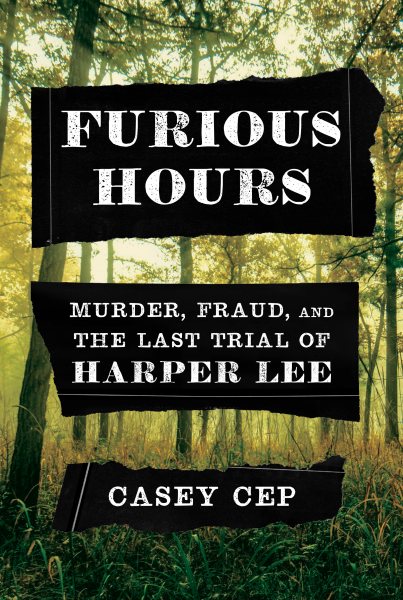Interview by Jana Hoops. Special to the Clarion-Ledger Sunday print edition (May 5)
In her debut book, writer Casey Cep takes on the almost unbelievable 1970s crime story of an Alabama man who dubbed himself “The Reverend” and went on to commit a spree of murders so outrageous that he would meet a shocking end to his own life–and his offenses would bring Pulitzer Prize-winning author Harper Lee to a decision to write her own account of his crimes.
 And although the celebrated author of To Kill a Mockingbird spent years dedicated to researching the story of “The Reverend” Willie Maxwell, Lee would never finish the book.
And although the celebrated author of To Kill a Mockingbird spent years dedicated to researching the story of “The Reverend” Willie Maxwell, Lee would never finish the book.
In Furious Hours: Murder, Fraud, and the Last Trial of Harper Lee, Cep chronicles the dual stories of Maxwell’s crimes with Lee’s unsuccessful attempt to complete her own narrative of those events, despite her obvious gift for journalism.
A Maryland native, Cep is a graduate of Harvard University and studied as a Rhodes Scholar at the University of Oxford. Her work has appeared in The New Yorker, The New York Times, and The New Republic, among others.
What drew you this unique story in Furious Hours and write it as not only a chronicle of “the Reverend” and his crimes, but an inner glimpse into the life of Harper Lee?

Casey Cep
I first learned of these murders while reporting on Lee’s novel Go Set a Watchman, so in some ways my book was always going to include her. The more I learned, though, the clearer it became that she wasn’t just a coda to the story, but an integral part of it. Her own reporting had been substantial, so I wanted to honor that, but I also thought her struggles provided a useful way of thinking about the aesthetic and ethical challenges that any journalist faces when trying to write about other people’s lives, especially with true crime.
Lee, who grew up known by her first name, Nelle, has said that she never felt like she fit in during her school years. Why was that?
Right, Nelle is Ellen backward, which her parents chose to honor her maternal grandmother. Stories about Lee as a young girl map onto her beloved heroine, so if you think about how Maycomb reacted to Scout Finch, then you get a sense of how Monroeville reacted to her: no one knew quite what to do with the clever tomboy who wore overalls and liked playing with the boys. Even when she went off to college, Lee stood out: quoting obscure English poets, wearing blue jeans, smoking, and swearing with gusto. From her letters, though, we know it was a bit of a two-way street: she was odd, but not an outcast; her distance from her peers was as much her own doing as theirs.
Lee longed to be a writer and envied her contemporaries whose personalities allowed them to blossom and share their talents, but there were times she found herself unable to write because she was between “perfectionism and despair.” How did this affect her writing?
I think perfectionism can make it hard to finish something and despair can make it hard to start, so if you are a writer who seesaws between the two, it can be paralyzing. Lee could spend an entire day on a single page but also impulsively toss out whole manuscripts, and because she valorized suffering as necessary for artistry, her struggles were self-reinforcing.
But she wasn’t like that when she wasn’t trying to write, and I found it moving when her friends would share memories of how charming she was, and how raucously funny she could be. Harper Lee would hold court with stories about her neighbors in Monroeville and her neighborhood in Manhattan that were like something out of Chaucer or Dickens, and you just wish she could’ve written them down as easily as she told them around the dinner table.
As Lee took an interest in the massive story of “the Reverend” and decided to write a book about it, it turned out that she was a keen investigative reporter, a task she obviously loved and was good at. It seems that she felt a sense of energy and pride as she worked on this crime story–but the book was never completed. Why?
You’re right that she was an incredible reporter. People she interviewed in Kansas while helping Truman Capote with In Cold Blood and people she interviewed in Alabama while working on “The Reverend” say she was the most interesting, inquisitive person they ever met.
She could put any source at ease, and she had the kind of patience it takes to get people to tell you their secrets. She was energized by the social aspects of reporting, but of course the hard part about writing a book is that at some point you have to actually write it, and she really struggled with that solitary work. She was also living in the shadow of her own bestselling, prize-winning masterpiece, so on top of everything else, she was facing sky-high expectations, from herself and from the world.
Your research for Furious Hours is impressive, as you give readers an inside look into decades-old crimes and their outcomes; as well as information about Lee that many have never heard. How did you approach the research and organization of this book?
Early on, I did what I always do when I’m starting something new: I read everything I could get my hands on. Not just about Harper Lee, but also voodoo, murder, the insanity defense, sharecropping, dams, revivals, insurance fraud, courthouses, and on and on and on. After that, I started tracking down leads about the original crimes, and then doing the same thing for Lee. I always knew the structure–the Reverend, the Lawyer, and the Writer–so I would just file what I found into folders and then organize the folders, and every day I’d hope to find some new document or convince someone new to talk with me. But at some point, you have to accept that some things are lost to time and some people just won’t talk with you, so you say a prayer, and start writing.
You say in the book that Lee “was so elusive that even her mysteries have mysteries.” Please explain.
I wrote that line when I was particularly struck by the incongruity between the tremendous interest in Lee and the paucity of information about her. She was always private, and she remained that way despite having written one of the world’s most popular novels. After years of reporting, and even getting to interview some of those who knew her best, there was still just so much more I wanted to know. I realize that everyone’s inner lives are somewhat mysterious–even those closest to us, like our siblings or our parents–so of course the mind and heart of an artist like Harper Lee will always remain a little elusive.
Casey Cep will at Lemuria on Monday, May 13, at 5:00 to sign copies of and discuss Furious Hours. Lemuria has selected Furious Hours its May 2019 selection for its First Editions Club for Nonfiction.


Comments are closed.